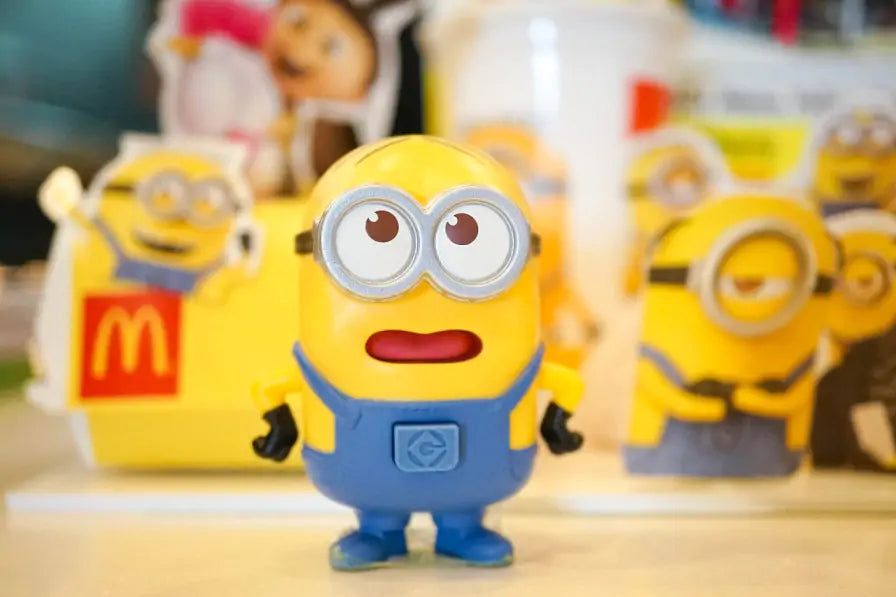Your basket is currently empty.
Shop NowIn the News: Recycle Toys from Happy Meals

In the News: Our Look at the Top Recycling Stories Making the Headlines
McDonald’s customers will be able to recycle toys from Happy Meals as well as toys sold by other brands, as part of a four week trial scheme across seven of its restaurants in the UK and Ireland.
Customers in St Ives, East Kilbride, Kingston, Milton Keynes, Blackpool, Cardiff, Roscrea in Ireland, and Eastleigh will be able to recycle the toys as part of the company’s drive to reduce plastic waste. If the scheme is successful, it will be rolled out across all of its UK and Ireland restaurants in 2020.
The toys will be recycled into new plastic products including coffee cups, bins, playground equipment, and vegetable planters which will be donated to communities.
McDonald’s has also announced that it will give customers the option to swap the toys in Happy Meals for fruit bags or books. It estimates that removing the toys from Happy Meals if customers choose, as well as removing plastic lids from the McFlurry, and removing single-use plastic from McDonald’s salads will reduce waste by over 1000 metric tonnes per year.
Parents complain that Happy Meal toys are adding to plastic waste problem
The move comes after an increasing number of parents complained that the plastic toys that often come with kid’s meals from fast food chains are quickly discarded and contribute to the plastic waste problem.
McDonald’s has faced recent criticism over failing to recycle paper straws, after it introduced them in place of plastic ones. The company claimed that it doesn’t yet have the recycling infrastructure needed to recycle the paper straws as they are relatively new to market.
The fast food giant’s sustainability manager said that the move to recycle plastic toys and turn them into new products is an important one because it wants to create genuinely useful products, increase the amount of plastic it recycles, and reduce the use of virgin plastic.
The problem of single-use plastic
The fight against plastic waste is front and centre in the public consciousness due to the airing of TV programmes like Blue Planet, and the work of environmental groups that have brought the issue to our attention.
Eight million tonnes of plastic end up in our oceans every year, and this has devastating effects on marine life and on fragile ecosystems. Much of this plastic is single-use plastic. The problem will only get worse if we don’t take action, and the government and big business have been forced to sit up and take notice.
Initiatives to reduce plastic
- The government has produced a 25-year environment plan, which includes plans to extend the 5p plastic bag charge to small retailers, a ban on plastic straws, and an upcoming ban on plastic drinks stirrers, and cotton buds.
- Forty big businesses including household names like Coca-Cola and Nestle, have signed up to The UK Plastics Pact, an initiative that aims to eliminate single-use plastic from packaging by 2025.
- Morrison’s, Tesco, and Waitrose are phasing in schemes where customers will be allowed to bring their own containers to the in-store meat and fish counters to cut down on the use of plastic bags.
- The government is currently pondering proposals to introduce a deposit return scheme for plastic bottles. Customers will pay around 5-10p more for their drinks which they will get back if they return the bottles for recycling.
While we might have the best of intentions when it comes to recycling plastics, not all types of plastic can actually be recycled, so they can still end up in landfill or in the environment even when we try to do the right thing.
What’s more, plastic is not like glass, which can be recycled time and time again with no reduction in quality. While it’s true that certain plastics can be made into very useful items, the reality is that most recycled plastics can’t be recycled more than once.
Recycling plastics is not the only solution
So when it comes to plastics, recycling is not the only solution. What we should be doing is reducing the amount of plastics we use in the first place (especially the single-use variety.)
How to cut down on the amount of plastic you use
- Carry a reusable water bottle with you instead of buying a plastic one.
- Invest in a reusable coffee cup instead of buying hard to recycle disposable ones.
- Take reusable shopping bags with you when you go to the supermarket.
- Buy your fruit and veg loose if you can, rather than in plastic packaging.
- Make your own lunch and take it to work in a plastic container rather than creating extra waste by buying pre-packaged sandwiches and salads. (it will save you money too.)
- If you’re having a party or get together at home, avoid using plastic straws, plastic cutlery, and plastic cups.
